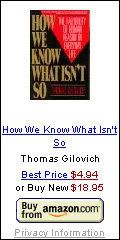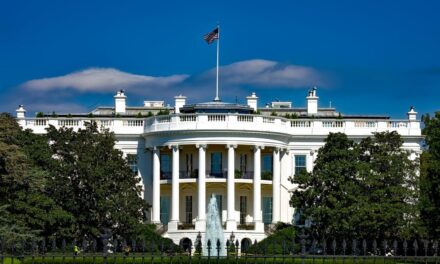
The Republican Party in the United States claims to represent the Conservative movement. But while Conservatism is usually defined by empiricism, a deep distrust of revolutionary ventures, and basing decisions on the world, and mankind, as they are, not on abstract ideology, as well as a distaste for the relativistic foibles of postmodernism, today’s Republican Party, headed by the Bush White House, is founded on a postmodern belief in creating reality by sheer force of will and exporting democratic revolution world wide. Less Edmund Burke and more Michel Foucault.
In Italian intellectual and author Umberto Eco‘s 1988 novel “Foucault’s Pendulum” three fellows working for a somewhat dodgy publishing house in Milan, are not only existentially bored by their routine job of conning would be authors into financing the publication of their own books, which will never see the shelves of a book store. They are also bemused by the number of manuscripts dropping into their post box purporting to blow the lid off that conspiracy or the other.
Anyone who has ever worked in publishing can attest to the number of such manuscripts. All those cranks, kooks, and plain crazies who these days set up conspiracy theory web sites on how the Illuminati, Bilderbergers, and gay Martians are all in it together, circling your house in unmarked helicopters, sending mind control rays into your noggin, which you can block by wearing a tin foil hat… they used to (and might still for all I know) bombard publishers with their less than fully baked intellectual products.
The three co-workers, Belbo, Diotallevi, and Casaubon are struck by how truly third rate most of these manuscripts are. Even madness requires some internal logic at least, and convincing details, to be at all compelling. Most of these kooks just don’t have the cerebral juice to “do it right”. Now if they turned their minds to it, they’d conjure up the mother of all conspiracy theories… So they start comparing notes. The Free Masons have to be in on it, of course. And the Knights Templar – you just can’t have a real conspiracy theory without them. But there has to be more to it than that. A real conspiracy theory has to both be all-encompassing, and invisible at the same time, like God. Everything, and everyone, has to be a part of it, even without them knowing, from the guy in the office next door, to the leaders of the Crusades, to Mickey Mouse.
But the more they spin and elaborate, the more convincing it becomes. It all just fits so neatly. After a while they start to not only convince people around them, but themselves. Perhaps they aren’t just making the whole thing up out of whole cloth, but actually unwittingly uncovering a real pattern that was always there. Having been caught up in the twisted logic of the conspiracy theory, reality begins to blur. And things take on a life of its own.
In the hands of a lesser artist, filmmaker, or the archetypal college stoners in a dorm room at five in the morning, this theme often devolves to: “Dude, like how can you be sure any of this exists? Maybe reality is just a figment of my imagination… Blows your mind, doesn’t it.”
This idea that reality is malleable and fluid, and always shaped by the views and view point of the observer, that there is no such thing as objective truth, is a central theme underlying the grab bag intellectual movement called postmodernism. It is also a deeply pre-modern one, akin to magical thinking of the past, mind over matter, and sympathetic magic (famously observed in recent times in splendidly elaborate form in the so called Cargo Cults). It is one that is shared by some of the most powerful people in the world at present.
Most anyone will now agree that spin and sheer wishful thinking played a big part in the policy and planning of the Bush White House, in particular as regards the run-up to, and conduct of the war in Iraq. Intelligence was stove-piped, and threats of WMDs exaggerated, to sell the invasion. Even rudimentary plans for the aftermath were discarded as unnecessary, and casting doubt on the success of the operation.
All of this, it could be argued, is only politics as usual, even if on a massive scale. But it goes beyond that. Nothing makes that clearer than the now famous exchange between author and journalist Ron Suskind and an unnamed White House staffer, related in the October 17, 2004 issue of The New York Time Magazine:
In the summer of 2002, after I had written an article in Esquire that the White House didn’t like about Bush’s former communications director, Karen Hughes, I had a meeting with a senior adviser to Bush. He expressed the White House’s displeasure, and then he told me something that at the time I didn’t fully comprehend — but which I now believe gets to the very heart of the Bush presidency.
The aide said that guys like me were ”in what we call the reality-based community,” which he defined as people who ”believe that solutions emerge from your judicious study of discernible reality.” I nodded and murmured something about enlightenment principles and empiricism. He cut me off. ”That’s not the way the world really works anymore,” he continued. ”We’re an empire now, and when we act, we create our own reality. And while you’re studying that reality — judiciously, as you will — we’ll act again, creating other new realities, which you can study too, and that’s how things will sort out. We’re history’s actors . . . and you, all of you, will be left to just study what we do.”
What this exchange crystallises perfectly, is to what degree the philosophical basis for the formally conservative Republican Party has shifted. Hard nosed reason, empiricism, a deep distrust of revolutionary ventures, and basing decisions on the world, and mankind, as they are, not on abstract ideology, – those were the core tenets of classic conservatism. The modern Republican Party, on the other hand, as illustrated above, is as postmodern as any liberal arts professor you’re likely to find.
Reality is but a creation of the senses. Therefore, whatever you believe is reality, becomes, in essence, reality. If, therefore, you alter the perception of reality, you alter reality itself. Whatever label one chooses to append to this thinking, it has few commonalities with conservatism, as hitherto understood.
Reality of course, has a tendency to assert itself, no matter the amount of will power applied to it. And created realities, some might simply call them fabrications, have a way of unravelling over time. Whether it’s a question of deeply held, but erroneous beliefs, or outright lies, the effect is the same – after a while, as you become ever more unmoored from reality, it becomes ever harder to keep your stories straight. The created reality loses consistency and dissolves into Surrealism, or perhaps more appropriately, Dada.
All insurgents in Iraq are ostensibly al-Qaida (which of course they’re not). Yet those very same insurgents are also armed and trained by Shia Iran, sworn enemy of the Sunni Salafists and al-Qaida… The need to paint the Sunni insurgency as mainly the work of foreign terrorists, in their “last throes”, and soon to be defeated, crashes head on into the wish to tar Iran as the great saboteur, as well as nuclear rogues, that might have to be dealt with by military means. On the home front too, message discipline is crumbling under the weight of previous created realities, some times almost from one sentence to the other. The latest press briefing by White House spokesman Tony Snow, as reported by Dana Milbank in yesterday’s Washington Post, borders on pure Surrealist poetry.
Logic suffered a more serious challenge when Bush press secretary Tony Snow, in his briefing, made the following points about Libby’s case:
· That Bush wasn’t “granting a favor to anyone” but that the case got his “special handling.”
· That it was not done for “political reasons” even though “it was political.”
· That it was handled “in a routine manner,” yet it was also “an extraordinary case.”
· That “we are not going to make comments” on the case, even though Bush had already issued a 655-word statement commenting on the case.
And if that makes sense to you, beware the Jubjub bird, and shun the frumious Bandersnatch.
“You’re insulting our intelligence,” one of the reporters advised Snow.
“How can you stand there with a straight face?” queried CBS News’s Bill Plante.
Even the true believers must find it hard by now to force suspension of disbelief. With almost all their constructed narratives crumbling, little remains but the underlying reality of raw naked power, wielded in the service of personal gain and aggrandisement, and questionable ideological goals. If there is any moral to the story, it is perhaps, that while postmodernism might make for some half way decent art, it produces really bad politics.









